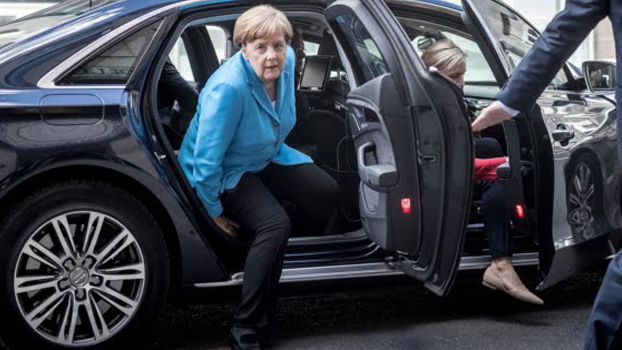When the mask slips in Germany
Clock is winding down on Angela Merkel’s leadership. The timing is against her party

On Sunday, voters in the German states of Rhineland Palatinate and Baden-Wurttemberg head to the polls to elect new regional governments — a politically tense time in normal circumstances. But now, at the beginning of the end of this coronavirus pandemic, everything is far from normal.
Germans, like much of the citizenry of Europe, are living under restrictions on how they live — even if vaccinations and lower rates mean that they can now at least get their hair cut and begin to mingle in small gatherings.
But the elections come at a time too when Merkel’s conservative bloc of Christian Democrats — the CDU and its sister party in Bavaria, the CSU — are embroiled in a corruption scandal that’s inextricably tied to the pandemic and the vast amounts of money that were thrown at it by governments responding to the crisis.
In the past week, Georg Nusslein of the CSU and Nikolas Lobel of the CDU have both resigned — and whatever way the resignations are examined, the optics are not good.
Lobel announced Monday he would resign from his parliamentary mandate with immediate effect and would not run for the Bundestag again — ending a political career after he quit the party on Friday and apologised after it was revealed that his company earned €250,000 (Dh1.092 million) from the brokering sales contracts for face masks between a supplier in his state of Baden-Wurttemberg and two private companies in Heidelberg and Mannheim.
While the amount involved wasn’t particularly large, the optics were. No one could excuse profiting from the pandemic.
“As a member of the Bundestag, and particularly in the specific backdrop of the pandemic, I should have conducted my commercial dealings with greater sensitivity,” Lobel said. His apology didn’t cut it — particularly after Susanne Eisenmann, the CDU candidate for state premier there told Der Spiegel that “it is unacceptable for parliamentarians to enrich themselves in this serious crisis.”
In Bavaria, Nusslein, a prominent lawmaker with the CSU is also being investigated in a corruption probe — again involving a masks’ procurement contract. He denies wrongdoing. While he intends to hold on to his seat, he has left the conservative group’s parliamentary bloc.
His lawyer had previously said Nusslein would not be running again in September when federal elections are due — elections that will decide who will become Chancellor of Germany when Merkel finally retires as the nation’s longest-serving post-war leader and who already has been at the helm for more than 15 years. Soon after September 26, there will be someone new sitting in the Chancellor’s office in Berlin.
The mask scandal, however, also serves as a reminder that not for the first time, there has been a whiff of cronyism surrounding Merkel’s party. In 2019, the party stuck by Phillipp Amthor, who pocketed more than €200,000 in stock options while lobbying the economy minister on behalf of a US tech company.
Naturally, given Sunday’s two state elections, opposition parties are smelling blood. The Social Democrats (SPD) have weighed in against their federal coalition partners and say that a transparency or lobbying register is essential to stamp out potential cronyism.
The conservatives might have to brace themselves for further losses in Sunday’s regional elections as a result of the scandals.
The increasing dissatisfaction with the government’s pandemic handling, not least the slower start to vaccinating, had already led to losses for the CDU in recent weeks in two of Germany’s most significant states.
Alternative for Germany (AfD), the far-right party, is also embroiled in a scandal of its own right now, and Berlin’s domestic security agency has placed it under surveillance for posing a threat to democracy.
Given Germany’s history, when the Federal Office for the Protection of the Constitution made the claim, it allowed authorities the right to legally tap AfD lie, monitor its communications and possibly use undercover informants in the ranks of the anti-immigrant party. If there’s a consolation for AfD, at least candidates running in September’s federal election will be exempt from the monitoring measures.
Whatever way Sunday’s elections unfold, it makes for an uncomfortable baptism for Armin Laschet, the heir apparent — at least since mid-January — to Merkel. The 60-year-old premier of North Rhine-Wesphalia made headlines a couple of years ago when he claimed he was a direct descendant of Charlemagne, who became King of the Franks in 774 and later went on to unite much of Western and Central Europe.
If Lashet succeeds in uniting his party, he’ll be doing well. After all, he only became party leader after Merkel’s hand-picked successor, Annegret Kramp-Karrenbauer, quit as CDU chair in February 2020 after an unsuccessful period in the spotlight. Merkel stepped down as party chair in December 2018.
And he’s not without a whiff of scandal either. An early advocate of relaxing Germany’s first lockdown in the spring, he drew criticism over lackadaisical leadership and most recently, there were charges of nepotism over personal protective equipment procured from a fashion company that also employs his son to model its clothes on his Instagram channel.
According to a poll by German broadcaster ZDF, only 28 per cent of Germans surveyed thought he had the calibre to become chancellor.
Come Sunday, voters will have their say — results that will be watched very closely indeed. Is it any wonder then that people are starting to wonder when will happen in Germany when Merkel’s mask finally does slip.
Mick O'Reilly is Foreign Correspondent, Gulf News.
Source: Gulf News


